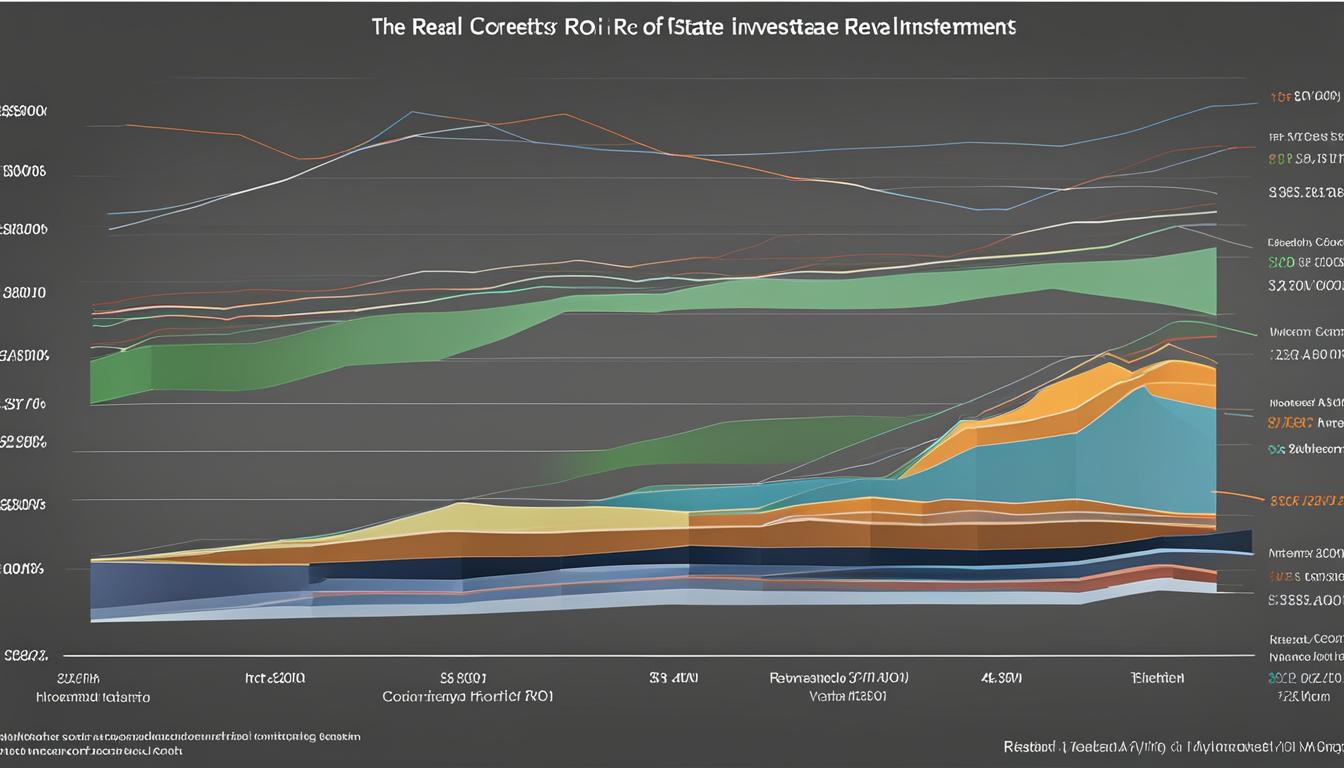In the competitive world of real estate investing, it’s crucial to have a knowledgeable and experienced partner by your side. Real estate agents play a vital role in helping investors make strategic property decisions that maximize profits. With their expertise in the US market and understanding of the nuances of real estate transactions, they can guide you towards lucrative opportunities and ensure that your investments yield the highest returns.
From leveraging like-kind exchanges to exploring self-directed IRAs, real estate agents have a deep understanding of the strategies that can propel your investments to new heights. They can help you navigate the complexities of tax-deferred exchanges and advise you on maximizing returns through alternative investment vehicles.
Key Takeaways:
- Real estate agents play a crucial role in helping investors make strategic property decisions.
- They have a deep understanding of the US market and can help you navigate its complexities.
- Real estate agents can assist you in leveraging strategies such as like-kind exchanges and self-directed IRAs.
- Their expertise can help you maximize profits and achieve your investment goals.
- Partnering with a real estate agent ensures you have a knowledgeable professional by your side throughout the investment process.
Like-Kind Exchanges – AKA: §1031 Exchange
A like-kind exchange, also known as a §1031 exchange, is a powerful tax strategy that allows real estate investors to defer taxes on the sale of a property if it is exchanged solely for another property of like-kind. By deferring taxes on the gain, investors can leverage their savings to purchase another property and compound their returns on investment. This strategy is especially beneficial for investors looking to maximize their profits in real estate investment.
However, it is important to note that like-kind exchanges come with certain caveats and regulations. One such limitation is the timing restriction, which requires investors to identify a replacement property within 45 days of selling their existing property. Additionally, the definition of “like-kind” property can be nuanced, and it is crucial to have a thorough understanding of the IRS guidelines to ensure compliance.
Real estate agents play a crucial role in helping investors navigate the complexities of like-kind exchanges. They have the knowledge and expertise to guide investors through the process, ensuring that all legal requirements are met and the maximum tax benefits are realized. By working closely with a knowledgeable real estate agent, investors can confidently utilize like-kind exchanges to defer taxes and compound their returns on investment.
Benefits of Like-Kind Exchanges:
- Defers taxes on the gain from the sale of a property
- Allows investors to leverage their savings to purchase additional properties
- Enables compound returns on investment
- Provides a powerful tax strategy for maximizing profits in real estate investment
Considerations for Like-Kind Exchanges:
- Strict timing restrictions
- Thorough understanding of IRS guidelines for “like-kind” property
- Importance of working with a knowledgeable real estate agent
| Pros | Cons |
|---|---|
| Defers taxes on the gain | Strict timing restrictions |
| Allows for leveraging of savings | Complex definition of “like-kind” property |
| Potential for compound returns | Requires guidance from a knowledgeable real estate agent |
| Maximizes profits in real estate investment |
Want to Join Houstir Inc to maximize investors' profit? Just click the button below
Self-Directed IRAs
Real estate investors looking to maximize their profits can utilize a powerful strategy known as self-directed Individual Retirement Accounts (IRAs). With self-directed IRAs, investors have the ability to invest in alternative assets, including real estate, within their retirement account. This strategy not only offers tax advantages and savings but also opens up a world of opportunities for compound returns and wealth building through rental properties and other real estate investments.
By leveraging self-directed IRAs, investors can benefit from tax-deferred growth on their real estate investments. This means that any profits generated from the sale of properties held within the IRA are not subject to immediate taxes, allowing investors to keep a larger portion of their earnings and reinvest them for further growth. The power of tax savings cannot be underestimated when it comes to maximizing profits in real estate investing.
Furthermore, self-directed IRAs provide investors with the flexibility to choose from a wide range of real estate investment options. Whether it’s residential rental properties, commercial properties, or even real estate crowdfunding platforms, investors have the freedom to diversify their portfolio and capitalize on different opportunities in the market. Real estate agents with expertise in self-directed IRAs can guide investors through the process, ensuring compliance with IRS regulations and helping them make sound investment decisions that align with their financial goals.
Incorporating Self-Directed IRAs into Your Investment Strategy
When incorporating self-directed IRAs into your real estate investment strategy, it’s essential to have a clear understanding of the rules and regulations surrounding these accounts. Working with a knowledgeable real estate agent who specializes in self-directed IRAs can provide valuable insights and guidance throughout the process.
Additionally, investors should carefully evaluate potential investment properties by considering factors such as location, market demand, rental income potential, and long-term growth prospects. Conducting thorough due diligence and financial analysis is crucial to ensure that properties held within a self-directed IRA align with your investment objectives and offer the potential for maximum profits.
By leveraging the power of self-directed IRAs, real estate investors can unlock new opportunities, maximize their profits, and build long-term wealth through strategic property decisions. Partnering with a skilled real estate agent who understands the intricacies of self-directed IRAs can provide investors with a competitive edge in the ever-evolving real estate market.
Real Estate Investing Strategies
Maximizing profits in real estate investing requires the implementation of effective strategies tailored to your investment goals. Here are some key strategies to consider:
1. Rental Properties
Investing in rental properties can provide a steady stream of passive income. By purchasing properties in high-demand areas and setting competitive rental rates, you can maximize your profits over time. Additionally, you can employ tactics such as tenant screening and property management to ensure a smooth rental experience and minimize vacancies.
2. Buy and Sell Equities
Another strategy is to buy properties at a discounted price and sell them for a higher price, also known as “flipping” properties. This strategy involves identifying undervalued properties, making necessary renovations or improvements, and selling them for a profit. It requires a keen understanding of market trends and the ability to accurately assess the potential for appreciation.
3. Diversify with Alternative Assets
Incorporating alternative assets in your real estate investment portfolio can help diversify your risk and potentially increase your profits. Consider investing in real estate investment trusts (REITs), which allow you to invest in a portfolio of properties without the need for direct ownership. Additionally, exploring crowdfunding platforms or investing in real estate-related stocks can provide exposure to the real estate market while minimizing the need for substantial capital.
Remember, each investment strategy comes with its own set of risks and rewards. It’s essential to thoroughly research and understand each strategy before committing your resources. Consulting with a reputable real estate agent can provide valuable insights and guidance to help you make informed decisions and maximize your profits in the competitive real estate market.
Conducting Market Research
When it comes to real estate investing, conducting thorough market research is a crucial step in making informed investment decisions. By analyzing various factors such as costs, rental prices, and investment strategies, you can gain valuable insights into the market and maximize your profits.
One important aspect of market research is comparing the costs associated with different properties. This includes not only the purchase price but also the expenses related to maintenance, taxes, and potential renovations. By understanding the costs involved, you can accurately estimate your potential profits and make informed investment decisions.
Rental prices are another key factor to consider during market research. Analyzing the rental prices in different areas can help you identify locations with high demand and rental income potential. This information can guide your investment strategy, allowing you to select properties that will generate consistent cash flow and ultimately increase your profitability.
| Market Research Factors | Importance |
|---|---|
| Costs | Understanding the financial implications of an investment. |
| Rental Prices | Identifying areas with high demand and rental income potential. |
| Investment Strategies | Selecting the most effective strategies for maximizing profits. |
Lastly, analyzing different investment strategies is an essential part of market research. This involves evaluating various approaches to real estate investing, such as rental properties, fix and flip, or commercial investments. By understanding the pros and cons of each strategy and considering your own goals and risk tolerance, you can choose the most suitable approach to maximize your profits.
Market research provides valuable insights that can help you make informed investment decisions in the dynamic real estate market. By comparing costs, analyzing rental prices, and evaluating different investment strategies, you can position yourself for success and maximize your profits in real estate investing.
Elevate investor profits through targeted market research. Click below to join us in Houstir Inc.
Financial Modeling and Analysis
When it comes to real estate investing, financial modeling and market analysis play a crucial role in making informed decisions and maximizing your profits. Financial modeling allows you to calculate the potential return on investment (ROI) and assess the financial feasibility of your real estate ventures. By accurately estimating your profits, you can make strategic decisions that align with your investment goals.
Market analysis enables you to gain insights into current market trends, potential risks, and investment opportunities. By understanding the market dynamics, you can identify the most promising areas for real estate investment and mitigate risks. Through comprehensive market analysis, you can determine the demand for rental properties, evaluate property values, and identify emerging trends that can guide your investment strategy.
Importance of Financial Modeling and Market Analysis
- Financial modeling helps you assess the financial viability of your real estate investments and make strategic decisions that align with your goals.
- Market analysis provides valuable insights into current market trends, risks, and investment opportunities, allowing you to make informed decisions.
- By combining financial modeling and market analysis, you can identify high-potential investment opportunities and maximize your profits in the real estate market.
To illustrate the significance of financial modeling and market analysis, let’s consider a case study.
| Investment Property A | Investment Property B |
|---|---|
| Location | Location |
| Property Type | Property Type |
| Purchase Price | Purchase Price |
| Estimated Rental Income | Estimated Rental Income |
| Expenses | Expenses |
| ROI | ROI |
By analyzing the financials and considering market factors such as location, rental demand, and property appreciation potential, you can determine which investment property offers a higher ROI and aligns better with your investment strategy. This demonstrates how financial modeling and market analysis can guide your decision-making process and help you maximize your profits in real estate investing.
Renovating Properties for Increased Profits
When it comes to real estate investment, purchasing a fixer-upper property can be a lucrative strategy for increasing profits. By acquiring a property in need of renovation at a lower price, you have the opportunity to add value through renovations and ultimately increase the potential selling price or rental income. However, it’s important to approach property renovations with careful planning, budgeting, and project management to ensure maximum profits.
Renovating a property for increased profits involves several key considerations. First, you need to carefully assess the property’s condition and determine the scope of renovations necessary to achieve your desired outcome. This may involve hiring contractors or coordinating renovation tasks yourself, depending on your expertise and resources.
Additionally, it’s crucial to create a realistic budget that accounts for all renovation expenses, including materials, labor costs, permits, and any unexpected expenses that may arise during the renovation process. By accurately estimating costs and staying within budget, you can optimize your profits and avoid any financial setbacks.
Table: Renovation Budget
| Expense | Estimated Cost |
|---|---|
| Materials | $X,XXX |
| Labor Costs | $X,XXX |
| Permits | $X,XXX |
| Contingency Fund | $X,XXX |
| Total | $X,XXX |
Throughout the renovation process, real estate agents can provide valuable guidance and expertise. They can assist you in identifying properties with renovation potential, offer insights on the potential return on investment, and recommend trusted contractors or professionals who can help you achieve your renovation goals. With their support, you can navigate the renovation process with confidence and maximize your profits in real estate investment.
Calculating ROI and Estimating Profits
When it comes to real estate investing, one of the most important factors to consider is the return on investment (ROI) and estimating potential profits. By accurately calculating the ROI, you can make informed decisions about which properties to invest in and how to maximize your returns.
To calculate ROI, you need to take into account several key factors. One of these is property valuation. By determining the current market value of the property, you can assess its potential for appreciation and calculate the potential profit when selling.
Another factor to consider is rental income. If you plan on generating income through renting out the property, estimating the rental income is crucial. This can be done by researching similar properties in the area and analyzing their rental rates. Taking into account factors such as vacancy rates and potential expenses, you can get a clear picture of the expected rental income.
It’s also important to consider any additional costs associated with the property, such as maintenance, repairs, and property management fees. By factoring in these expenses, you can get a more accurate estimation of your profits.
Estimated Profit Calculation Example:
| Property Purchase Price | $250,000 |
|---|---|
| Property Valuation after 5 years | $350,000 |
| Rental Income per month | $2,000 |
| Estimated Annual Expenses | $5,000 |
| Estimated Annual ROI | 8% |
In the example above, the property was purchased for $250,000 and is estimated to appreciate to $350,000 in five years. With a rental income of $2,000 per month and estimated annual expenses of $5,000, the estimated annual ROI is 8%. This calculation gives you a clear idea of the potential profitability of the investment.
By carefully calculating the ROI and estimating profits, you can make more informed decisions about your real estate investments. Working with a knowledgeable real estate agent can also provide valuable insights and guidance throughout the process, ensuring that you maximize your profits in the dynamic real estate market.
Tax Benefits and Incentives
When it comes to real estate investing, understanding the various tax benefits and incentives available can greatly contribute to maximizing your profits. By taking advantage of these opportunities, you can optimize your tax strategy and increase your overall profitability in the real estate market.
One of the key tax benefits for real estate investors is depreciation deductions. Depreciation allows you to deduct the cost of wear and tear on your rental properties over time, reducing your taxable income. This can result in significant savings and increased cash flow, ultimately maximizing your profits.
Another lucrative tax incentive is the opportunity zone program. Opportunity zones are designated areas that offer tax breaks for investments in underserved communities. By investing in these zones, you can not only benefit from potential appreciation and rental income but also enjoy substantial tax advantages, further enhancing your profitability.
It is important to note that navigating the tax landscape can be complex, and it is advisable to work with experienced professionals, such as real estate agents and accountants, to optimize your tax strategies. They can provide valuable insights and guidance specific to your real estate investments, helping you make informed decisions that result in maximized profits.
Key Tax Benefits and Incentives:
| Tax Benefit/Incentive | Description |
|---|---|
| Depreciation Deductions | Allows deduction of property wear and tear, reducing taxable income. |
| Opportunity Zones | Offers tax breaks for investments in underserved communities. |
By leveraging tax benefits like depreciation deductions and participating in opportunity zone investments, you can significantly increase your profits in real estate investing. Remember to consult with professionals familiar with the intricacies of tax laws to ensure you maximize your gains and comply with all regulations.
Location Matters: Investing in Proximity to Amenities
When it comes to real estate investing, one key factor that can significantly impact your profits is the location of your rental property. Investing in properties that are in close proximity to amenities such as public transportation, shopping centers, and other conveniences can attract high-quality tenants and lead to increased rental income. The convenience and attractive living environment offered by these amenities make the rental property more desirable, resulting in higher demand and the potential for higher profits.
Imagine owning a rental property that is located within walking distance of a popular shopping center. Tenants will appreciate the convenience of having shops, restaurants, and entertainment options just a stone’s throw away from their doorstep. This proximity to amenities not only enhances their overall experience but also makes it easier for them to meet their daily needs without having to travel far. As a result, they are more likely to stay in the property for longer periods, reducing vacancies and ensuring a steady stream of rental income.
In addition to attracting quality tenants, investing in rental properties near amenities can also command higher rental prices. Tenants are willing to pay a premium for the convenience and lifestyle benefits they enjoy by living in a location with easy access to amenities. This higher rental income can significantly boost your profits as a real estate investor and help you achieve your financial goals.
Real estate agents play a valuable role in assisting investors in identifying locations with desirable amenities. They have the market knowledge and experience to help you make informed investment decisions that will maximize your profits. By working with a real estate agent, you can ensure that your rental property is strategically located to attract tenants seeking an attractive living environment with convenient access to amenities.
| Amenities | Benefits |
|---|---|
| Public transportation | Easy commute for tenants, increased tenant pool |
| Shopping centers | Convenience, variety of options, higher demand |
| Restaurants and entertainment | Enhanced lifestyle, increased tenant satisfaction |
| Parks and green spaces | Recreation opportunities, improved quality of life |
Investing in rental properties near amenities is a smart strategy for maximizing your profits in the real estate market. By capitalizing on the convenience and attractive living environment that these amenities offer, you can attract quality tenants, command higher rental prices, and ensure a steady stream of rental income. Working with a real estate agent will help you identify the ideal location for your investment property and set you on the path to success.
Conclusion
In conclusion, real estate investing provides a range of opportunities for investors to maximize profits through strategic property decisions. By utilizing strategies such as like-kind exchanges and self-directed IRAs, investors can defer taxes and compound their returns on investment. Real estate agents play a crucial role in guiding investors through these complex strategies and helping them make informed decisions in the US market.
Conducting thorough market research is essential before making any investment decisions. By comparing costs, rental prices, and investment strategies, investors can identify opportunities to increase their profitability. Financial modeling and analysis skills are also key for accurately estimating returns on investment and assessing potential risks.
Additionally, investors can enhance their profits by considering tax benefits and incentives, such as depreciation deductions and opportunity zones. Furthermore, investing in properties close to amenities can attract high-quality tenants and increase rental income.
Overall, real estate agents provide valuable insights and expertise throughout the entire investment process. By working with knowledgeable professionals, investors can maximize their profits in the dynamic real estate market.
Want to Learn from California’s leading real estate instructors to know more about real estate and maximizing profits for investors?







